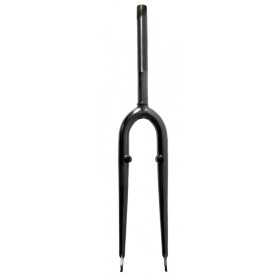-
 New product26 inch rigid chrome v-brake mountain bike fork
New product26 inch rigid chrome v-brake mountain bike fork- €48.99
Showing 1-1 of 1 item(s)
The fork on a trials mountain bike is an essential component that greatly influences the performance, handling and comfort of the bike when riding trials, a discipline that emphasizes precise overcoming of obstacles. Here is a description of its function, its characteristics and the associated standards:
Function :
1. Shock absorption:
The main function of a trials mountain bike fork is to absorb shock and vibration from the rough terrain encountered when riding trials. This allows the rider to maintain control and balance while navigating obstacles.
2. Depreciation:
The trials fork is equipped with a damping system (usually hydraulic) that helps regulate the speed of compression and rebound, providing additional control over the bike.
Features :
1. Travel:
Trial mountain bike forks generally have limited travel, often less than 100 mm, sometimes even without travel. This allows for better responsiveness and control in situations where precision is crucial.
2. Geometry:
Trial forks have a specific geometry that promotes maneuverability and precision. They often have steeper head angles and lower bottom bracket heights for a lower center of gravity, improving stability in technical sections.
3. Rigidity:
Trial forks are designed to be extremely stiff to resist lateral forces and maintain steering precision during maneuvers and jumps. This allows the rider to better control the bike in trials situations.
4. Weight:
As light weight is essential for handling and responsiveness in trials, trials forks are often made with lightweight materials such as aluminum or carbon, while still maintaining adequate rigidity.
Standards:
1. Swivel diameter:
Trials forks typically use a standard 1 1/8-inch diameter steerer tube to fit most mountain bike frames. Some forks may use specific steerer diameters, however, so it is important to check compatibility with the bike frame.
2. Wheel size:
Trial mountain bike forks are designed to fit 26-inch wheels, which are commonly used in this discipline due to their lightness and maneuverability.
In summary, the fork of a trials mountain bike is a crucial component that influences the performance and handling of the bike in technical trials situations. With specific features such as limited travel, adapted geometry and high rigidity, it offers precise control and effective shock absorption when crossing obstacles.
